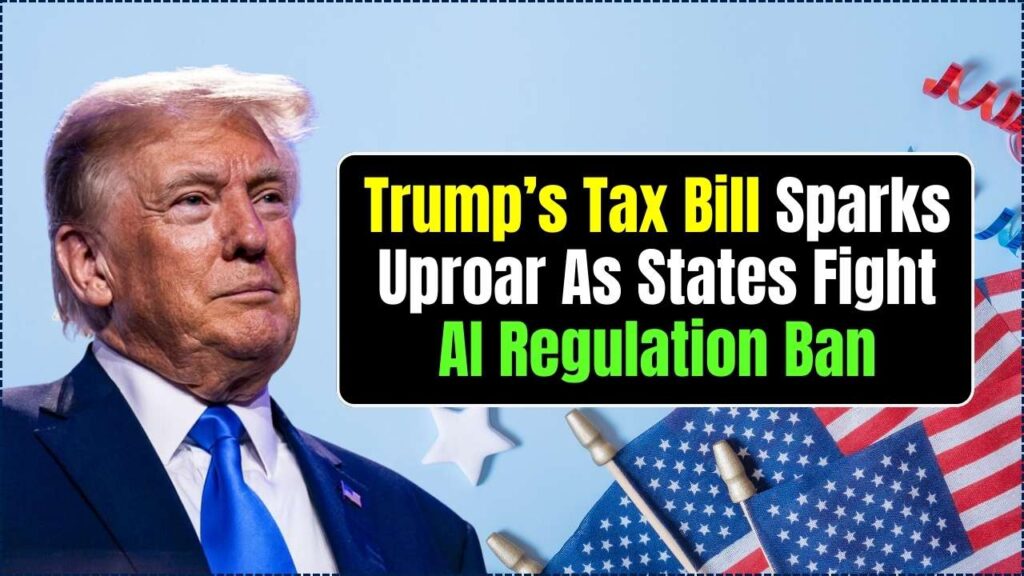Trump’s Tax Bill Sparks Uproar: A controversial provision in former President Donald Trump’s proposed tax reform bill has ignited a nationwide uproar. Hidden deep within the sweeping budget legislation is a clause that would impose a 10-year federal ban on state and local regulations of artificial intelligence (AI). While the bill aims to reshape fiscal policy, it now finds itself at the center of a fierce debate over AI oversight, federalism, and tech accountability.

Legal experts, policymakers, and civil rights advocates are expressing alarm, warning that this ban could eliminate critical protections against AI-driven harm. Dozens of state attorneys general, including representatives from California, New York, Ohio, and Tennessee, have come together in rare bipartisan opposition.
Trump’s Tax Bill Sparks Uproar
| Feature | Details |
|---|---|
| Main Issue | 10-year ban on state and local regulation of AI in proposed federal tax bill |
| Opposition | 40+ state attorneys general, bipartisan concerns in Congress |
| Supporters | Tech firms (e.g., Google), GOP lawmakers seeking federal standard |
| Criticism | Risk of regulatory vacuum, nullification of consumer protection laws |
| Legal Hurdles | Byrd Rule compliance issues in the Senate |
| Relevant Sources | Reuters, AP News |
Trump’s tax bill has become more than a fiscal debate—it’s now a national flashpoint in the fight over AI regulation and states’ rights. While the tech industry calls for consistency, many fear that this ban goes too far, too fast—leaving Americans vulnerable just as AI’s influence reaches new heights.
The coming weeks will be critical. As lawmakers negotiate the bill, the future of AI governance in the United States hangs in the balance. Whether they uphold state authority or centralize control, their decision will impact everything from personal privacy to democratic integrity.
What’s in the AI Regulation Ban?
A Closer Look at the Clause
The clause, buried in the larger budget reconciliation package, would prohibit states and municipalities from creating or enforcing new AI regulations for a full decade. It would also override many existing laws passed in recent years by state legislatures.
The language is broad and sweeping, blocking enforcement around:
- Deepfake and synthetic media laws
- AI-related consumer protection measures
- Transparency mandates for AI in healthcare and finance
- Employment and housing anti-bias regulations using AI tools
While the proposal claims to encourage innovation by ensuring a “nationally consistent approach,” critics argue it does not include any substantive federal AI safeguards to replace those being preempted.
Why Are States Fighting Back on?
Consumer Protection at Risk
States like California have already passed robust laws around AI. For example:
- Criminalizing non-consensual AI-generated explicit images
- Requiring transparency in AI use by insurers and healthcare providers
- Banning deepfakes in political advertisements
These regulations aim to prevent exploitation, misinformation, and bias in AI systems.
California Attorney General Rob Bonta stated: “I strongly oppose any effort to block states from developing and enforcing common-sense regulation. States must be able to protect their residents.”
A Bipartisan Alliance
Remarkably, both red and blue states are aligned on this issue. Attorneys general from traditionally conservative and liberal states alike have expressed frustration, saying the federal ban would tie their hands and leave citizens vulnerable to AI-driven discrimination, fraud, and privacy violations.
Industry Backing and the Push for a Unified Standard
Tech Companies Support a Federal Approach
Big tech players like Google, Meta, and Amazon are reportedly in favor of a federal AI framework to avoid conflicting rules in 50 different states. Their position is that innovation thrives in a streamlined regulatory environment, especially for technologies as complex and fast-evolving as AI.
Supporters of the provision argue that a patchwork of state laws could stifle innovation, increase compliance costs, and create legal uncertainty for developers.
The Problem with Preemption Without Protection
However, critics stress that there is currently no comprehensive federal AI regulation in place. Preempting state laws without establishing federal protections would effectively leave the public exposed to AI risks.
Legal and Legislative Challenges
The Byrd Rule Barrier
The Senate may not allow the AI ban provision to pass through reconciliation due to the Byrd Rule, which restricts budget bills to items directly affecting federal revenue or expenditures. Senator John Cornyn (R-TX) has questioned the appropriateness of including regulatory preemption in a fiscal package.
Congressional Pushback
Multiple lawmakers have voiced concerns about the bill’s attempt to override state autonomy. Some advocate for a “dual track” system, allowing states to implement regulations while the federal government develops a unified standard.
What Trump’s Tax Bill Sparks Uproar Mean for AI Development?
Implications for Healthcare, Finance, and Education
Without state oversight, sectors using AI for high-stakes decisions—like credit approval, hiring, medical diagnostics, and student grading—would lack clear accountability structures. This could lead to:
- Bias in lending or hiring decisions
- Invasive patient monitoring tools without consent laws
- Automated misinformation in political campaigns
Public Trust and Adoption
Studies consistently show that public trust in AI is closely linked to transparency and regulation. Weak oversight could erode consumer confidence, especially among vulnerable communities disproportionately affected by algorithmic bias.
What Can Be Done? Practical Actions and Policy Suggestions
Creating Balanced Legislation
Policymakers can:
- Establish a federal AI regulatory commission
- Encourage state-federal cooperation on AI ethics and enforcement
- Define clear standards for algorithmic transparency and accountability
Industry Best Practices
Even without regulation, companies can adopt ethical practices:
- Conduct bias audits and publish transparency reports
- Allow users to opt out of AI decisions
- Use human-in-the-loop systems for critical decision-making
FAQs On Trump’s Tax Bill Sparks Uproar
What is the AI regulation ban in Trump’s tax bill?
It’s a provision that would block states and local governments from passing or enforcing AI regulations for 10 years.
Why are states opposing the ban?
States argue that this would nullify their current AI laws, prevent them from protecting citizens, and leave a regulatory vacuum.
What are the risks of not having AI regulation?
Without oversight, AI can reinforce bias, invade privacy, and contribute to misinformation or even fraud.
Is there a federal AI regulation in place?
No. The U.S. lacks a comprehensive federal law governing AI. Some executive orders and agency guidelines exist, but they are limited.
Can this provision be removed from the bill?
Yes. The Senate may reject it under the Byrd Rule, or lawmakers could vote to strip it during reconciliation.






